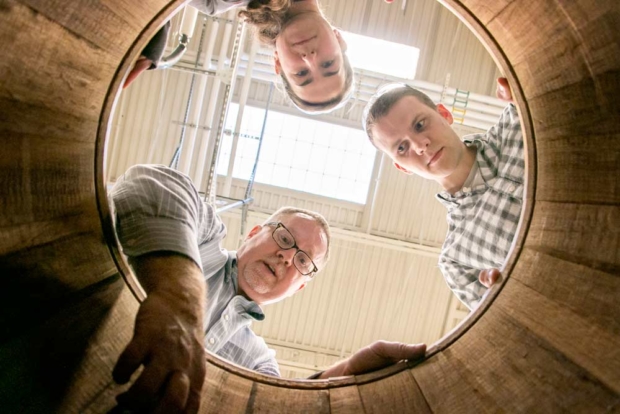
Air Force veteran Nick French, right, learns how to open and inspect a wine barrel Wednesday, Oct. 18, 2017, at the Washington State University Tri-Cities campus Wine Science Center in Richland. Veterans such as French are entering vineyard and enology courses at a higher rate than other disciplines at WSU. Teaching the course is assistant professor Tom Collins and watching is his research assistant Rosemary Veghte. (Ross Courtney/Good Fruit Grower)
There’s something about all the hands-on work that attracted Nick French, a former Air Force mechanic, to the wine industry. He likes getting his hands a little dirty and working with equipment.
“Coming from a military background, being maintenance, I was looking for a degree that was more technical in nature, more hands on, more of a skill that I could learn and get better at, rather than some of the (theory) of some of the other degrees,” he said. “So right away, that was a big pull for me.”
He also likes that wine is a growing field with clear job opportunities for the 26-year-old married father of two, with another child on the way. And with the new Washington State University Wine Science Center with state-of-the-art laboratory equipment right near his childhood home in Richland, Washington, he couldn’t resist.
Those must be common attractions for service men and women. At WSU — at both the Pullman and Richland campuses — veterans are entering viticulture and enology programs more than twice that of other fields.
It’s hard to hang the word “trend” on the statistics, said Mika McAskill, director of admissions and recruitment for the Richland campus, which only has about 2,000 students. The rapidly growing wine industry has been attracting a lot of interest in recent years from students of all kinds, even from out of state.
Meanwhile, the campus itself is attractive to veterans. WSU-Tri-Cities, named for Richland, Pasco and Kennewick, has twice the rate of veterans as the overall university and has been dubbed a “Military Friendly School” by Victory Media, publisher of G.I. Jobs and Military Spouses. The campus, located near the Hanford nuclear site, draws nontraditional students already several years removed from high school and looking for science-based professions with visible opportunity for employment. Wine is one of those.
McAskill suspects word of mouth among veterans has helped drive enrollment at the wine programs. Anecdotes gleaned from a few conversations she had with veterans at — where else — a wine bar, sound similar to French’s. Two young men recently discharged from service eager to support young families in a growing industry that involves hands on work.
French spent three years on active duty in San Antonio and Wichita, Kansas, before two years in the Air National Guard at Fairchild Air Force base in Spokane, Washington. Today, he works for the Vet Corps, a division of the Washington Department of Veterans Affairs that helps veterans navigate higher education.
French originally intended to study business but a family friend who worked for Ste. Michelle Wine Estates turned him onto viticulture and enology.
“I know what I can do when I’m done with it,” he said.
French spent one afternoon in October learning how to crack open the head of a wine barrel and inspect the quality of the cooper’s work inside. It wasn’t required for the winery equipment course, but the lesson involved the hands-on work French likes, hammering the hoops on and off, inspecting the joints of the staves and taking note of the depth of the toasted layer. Putting it back on was physical challenge, too, but French, his professor and a research assistant eventually wrangled it into shape.
His professor is also a veteran.
Tom Collins, an assistant professor of vineyard and enology at the Wine Science Center, served in the U.S. Navy from 1984 to 1988, and earned a Bachelor’s degree in Russian and Soviet studies at Cornell University with an NROTC scholarship. On weekends, he explored the Finger Lakes region of upstate New York, often working for wineries. He continued that while serving his four years of active duty in Rhode Island and Philadelphia
He kept working in the wine industry as he continued his education and research at the University of California-Davis, eventually earning a Ph.D. in agricultural and environmental chemistry.
Wine employers often told the retired lieutenant they were attracted to his supervisory experience honed during his military officer years. He also values his military lessons of public speaking and sheer hard work.
“Putting in long hours is something you get used to,” he said.
— by Ross Courtney






Leave A Comment